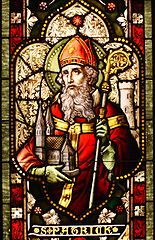
The Life And Writings Of Saint Patrick -Saint Patrick
VI.—FOOD FOR THE SCHOLARS
The next and one of the last incidents related in the Tripartite gives us a glimpse of St. Patrick’s efforts to establish and maintain a school in his young church at Armagh. It is true indeed that the locality is not exactly determined, but the circumstances point to Armagh as the most likely scene of the narrative.
A pious couple, named Berach and Brig, brought to Patrick three cheeses made of curds with a quantity of butter also. “These,” they said, “are for the boys.” “Good, indeed,” said Patrick, for he, doubtless, well knew how soon his hungry scholars would dispose of them. Thereupon a foreign Druid, Galldrui, he is called, who had, it seems, come to visit Patrick from Britain or elsewhere, said—“I will believe in your religion if you turn these cheeses into stone.” And Patrick by the power of God, did turn them into stones. “Now turn them back again into cheeses,” said the Druid. ‘Patrick did so.’ “Turn them once more into stones,” said the incredulous Druid, and once more Patrick changed the cheeses into stone. “Now turn them back again into cheeses.” “No,” said Patrick, “they shall remain stones for ever in commemoration of this deed—of God’s power and your incredulity—until shall hither come another servant of God to take charge of them.” ‘He meant Dichuill, who is in Ernaide.’ Then at length the Wizard believed in God and St. Patrick.
Patrick, perhaps in anger, threw his hand-bell from him into a thick brake which grew in the place; and, as it remained there, a young birch tree grew up through its handle—that is through the hole formed by the handle. When, in after times, Dichuill came to the place, he found the iron bell, with the birch growing through it, hence its name, Bethechan, and he took it to his oratory, where it still remains. And there, too, near the oratory, stand the two stones that were made out of the cheeses. But the third stone—there were three cheeses—was carried to Louth by Dichuill when he became abbot there. ‘It stands to-day in Gort Conaich, and is to be sought in the church.’
It would be very interesting to know exactly the site of this miracle. If it was not Armagh it must have been somewhere in the neighbourhood of Louth, and, doubtless, took place whilst Patrick was sojourning there. Colgan thinks the Dichuill here referred to was Dichuill of Cluain Braoin, whose festival is assigned in the Martyrology of Donegal to the 1st of May. Cluain Braoin was, he tells us, in the neighbourhood of Louth, where the saint had his first oratory, but when he became Abbot of Louth he took the bell with him, and the cheese-stone, which he kept in the church, to be, as Patrick said, a memorial of the miracle for coming ages. The Church (or the stone) stands to-day, says the Tripartite, in Gort Conaich. We cannot find the name near Louth, but there is a townland called Gortconny in the parish of Ramoan, Co. Antrim, which, however, can hardly have been the place here referred to by the author of the Tripartite. The narrative shows one thing at least, that in the time of St Patrick the Irish made their cheeses at home, although now it is the fashion to import them from England. Butter, too, as we know from the Lives of several of our early saints, was always extensively made in Ireland, and was highly valued as an article of food. The Brehon laws prescribe a ration of butter for the sons of chiefs, when they were at school; from which we may fairly infer that it was more or less of a luxury for the lads of inferior degree. On this occasion, although Patrick changed the cheeses that were destined for the scholars into stones—when the honour of God demanded it—he did not touch their butter, which no doubt, they greatly relished.
This story of the cheeses and butter, according to the Scholiast on Sechnall’s Hymn, is closely connected with the first recitation of the Hymn. We are told that when Sechnall had finished reciting the Hymn, Berach and Brig came up, bringing food to Patrick, to wit, cheese and butter. Whereupon Patrick said “wherever this Hymn shall be sung before dinner, no scarcity of food shall be there”; because it would appear that on this occasion it brought up the cheese and butter. “And,” added Patrick, “the new house in which it shall be sung first of all, shall have Patrick and the saints of Erin to watch over it.” If this story be true, then the miracles of the cheeses changed into stone would have taken place somewhere near the pass at Forkhill, on the road to Armagh, and the youngsters would be some students in the train of Patrick, although there is no other reference to them here.

 Keep Site Running
Keep Site Running